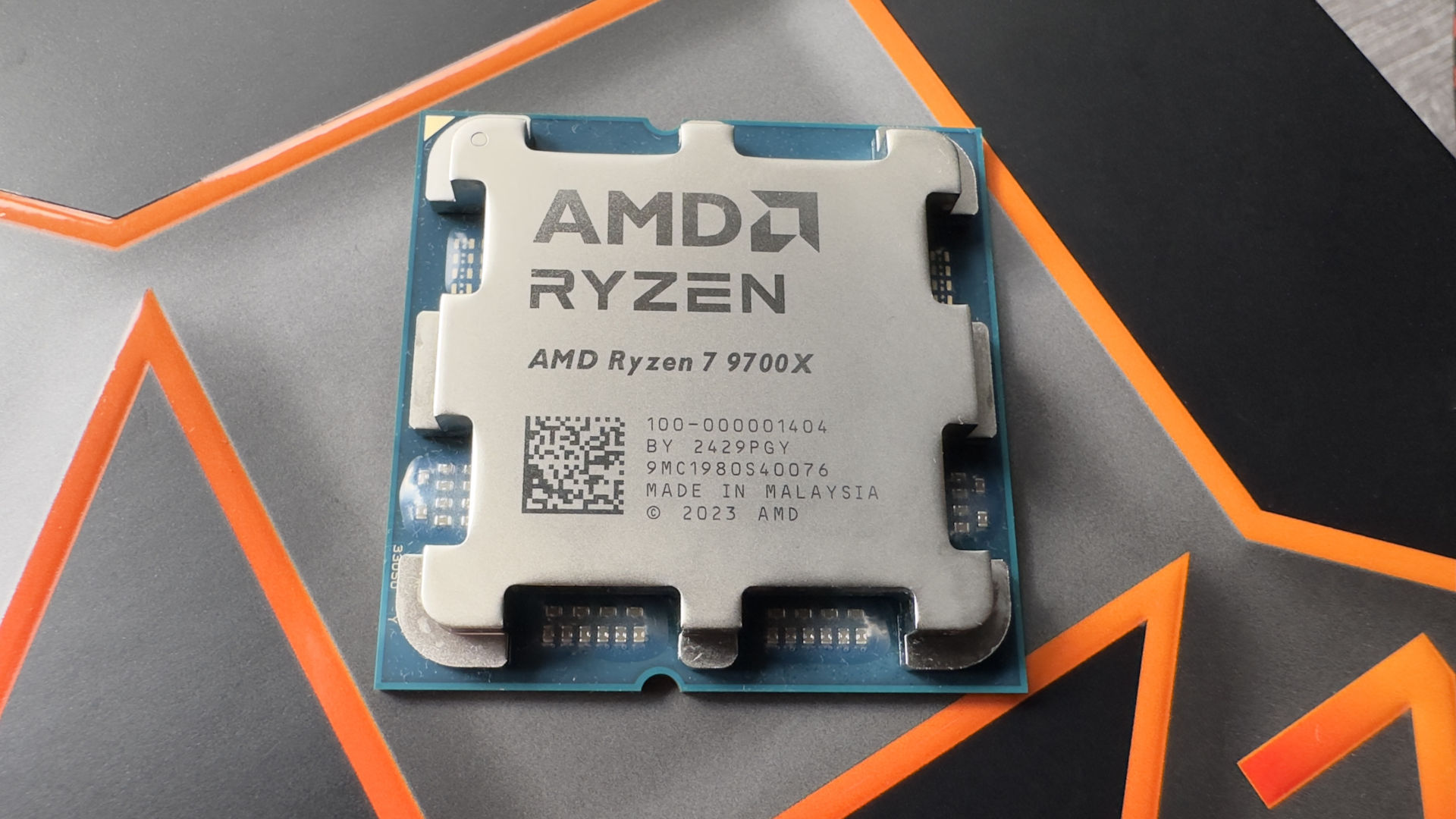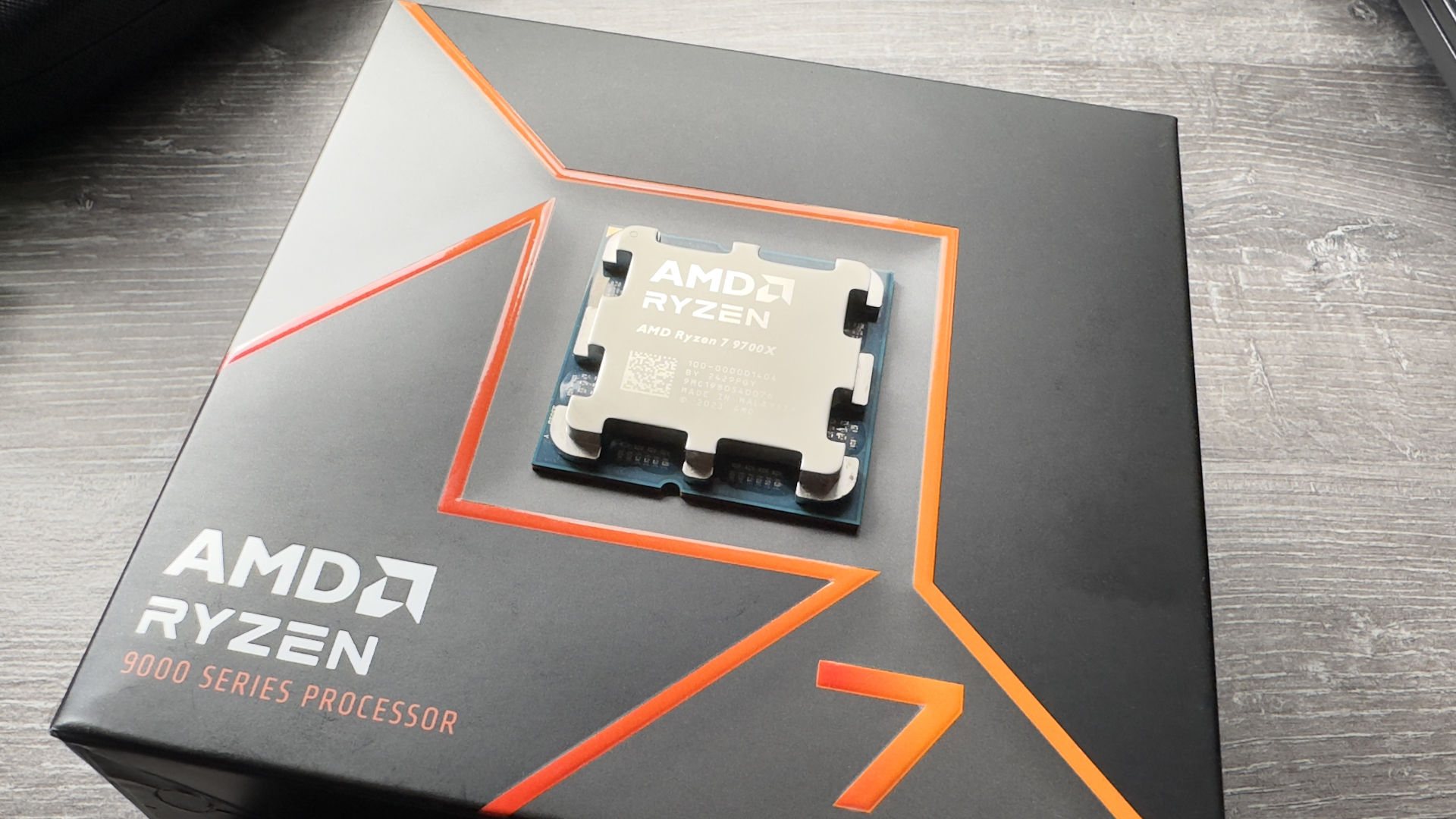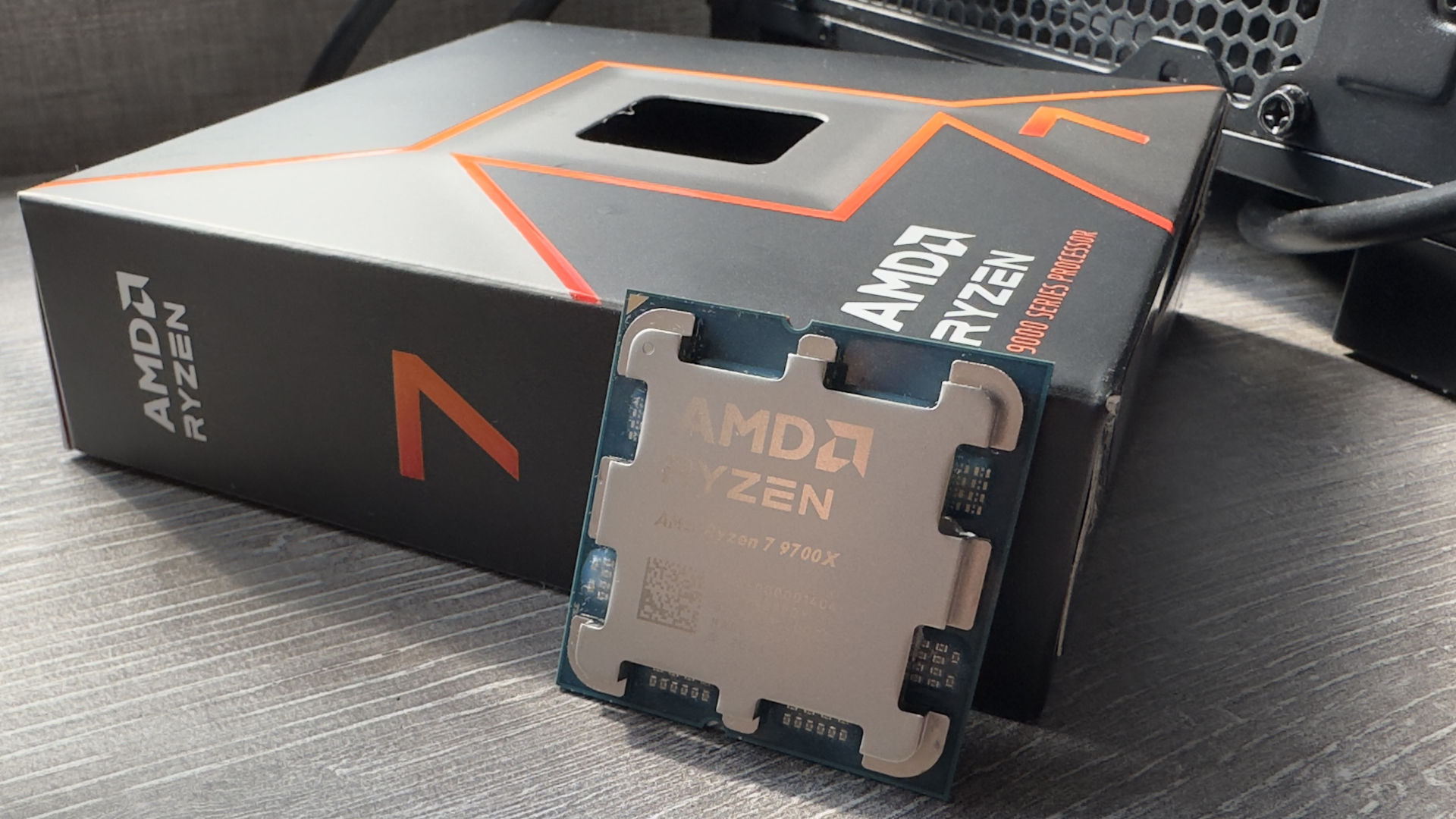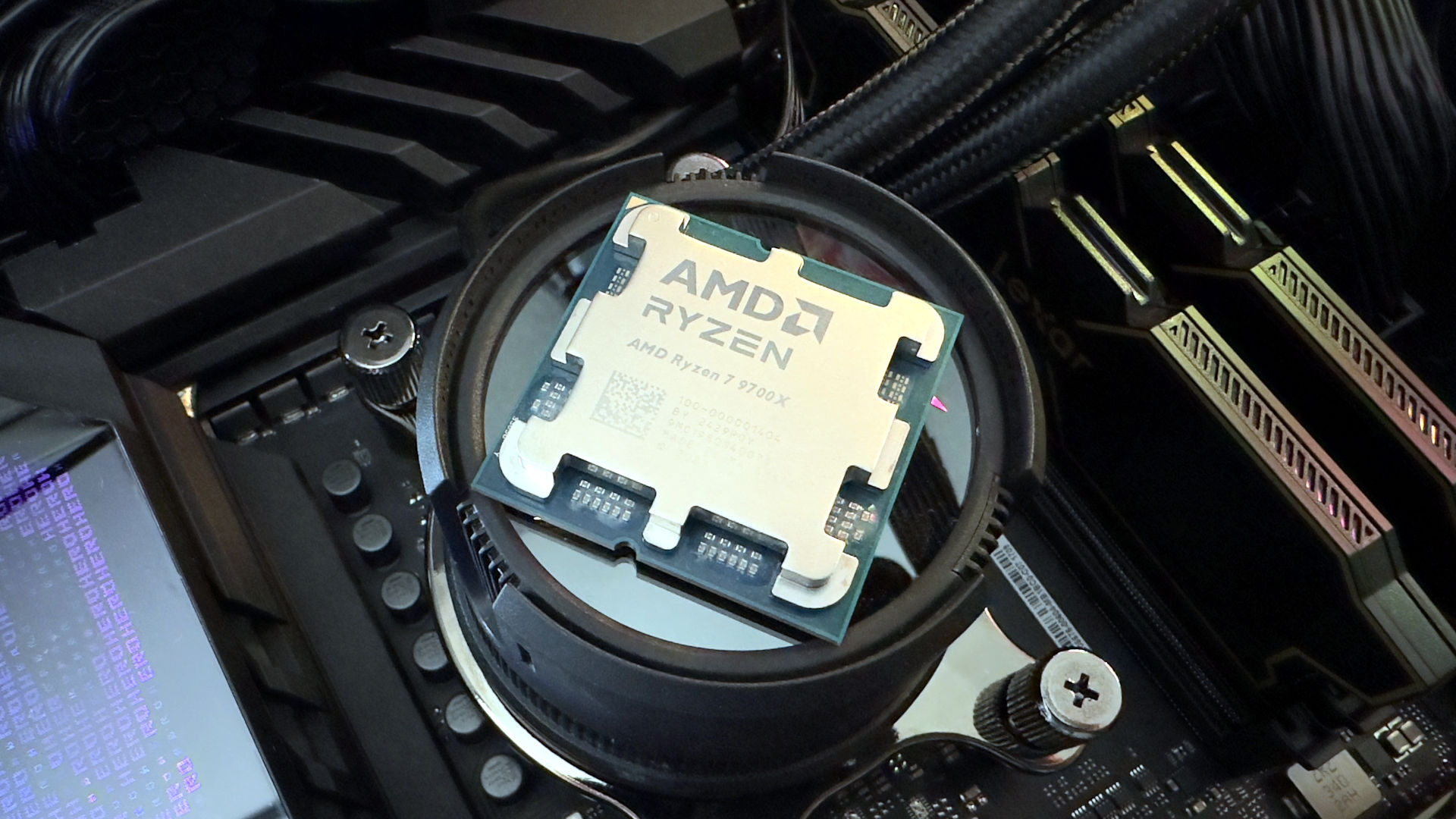Our Verdict
This mid-tier Ryzen 7 9700X processor is genuinely fast and power efficient. For an all-round CPU, the price is very tempting but if you're a gaming enthusiast, you'll probably be better off waiting for the X3D models.
For
- Zen 5 can be really fast at times
- Good all-round performance
- Sips away at power
Against
- Power niggles need sorting to reach peak performance
- You'll probably want the X3D model for gaming
- Zen 4 is better value for money
PC Gamer's got your back
Zen 5 is finally here for desktop PCs and having already tasted what it is like with six cores, in the AMD Ryzen 5 9600X review, it's time to see what difference two more cores, four more threads, and a tiny bit more clock speed all makes—that's right, it's our review of the Ryzen 7 9700X.
AMD has stuck to the same fundamental floorplan for the 9700X as it has with the last generation 7700X and the Zen 3-powered 5700X. Underneath the heatspreader, you've got two chiplets: one CCD (Core Complex Die), which houses all the processing cores and cache, and one IOD (Input/Output Die) that's home to a tiny integrated GPU, PCIe and USB hubs, and the RAM controllers.
Where the CCD in the 9600X has two cores disabled, the 9700X comes with a fully enabled eight-core chiplet and a marginally higher boost clock (5.5 vs 5.4 GHz).
That 8.3 billion transistor CCD sports the latest AMD Zen 5 architecture, of course, with more L1 cache, more internal bandwidth, superior floating point support, a fancier branch prediction unit, and so on. The changes are pretty comprehensive and AMD claims that Zen 5 has an average IPC (instruction per clock) uplift of 16% over Zen 4, though not every application is going to see such an increase.
Cores: 8
Threads: 16
Base clock: 3.8 GHz
Boost clock: 5.5 GHz
L3 Cache: 32 MB
L2 Cache: 8 MB
Unlocked: Yes
Max PCIe lanes: 24
Graphics: Radeon Graphics
Memory support (up to): DDR5-5800
Processor Base Power (W): 65
Maximum Package Power (W): 88
Recommended customer price: $359 | £340
I won't reiterate all the motherboard swapping and BIOS shenanigans I experienced testing the 9600X in this review, but it's worth noting they impacted the Ryzen 7 9700X just as much. Basically, the AM5 motherboard I used (a ROG Crosshair X670E Hero) was supplying the chip with a little bit too much power when idle, resulting in slightly elevated temperature—this isn't something exclusive to Asus boards but not every configuration will experience the issue.
That said, the 9700X did idle a little cooler than the 9600X I tested, resting around the 45 °C mark, although it does have a marginally lower base clock (3.7 vs 3.8 GHz).
The power niggles also meant that the chip wasn't able to quite hit its full stride when running heavily multithreaded applications, such as Cinebench and Blender. I have no doubt that these will be fixed in time, and quite possibly very soon, but if you were looking to be a Zen 5 chip for demanding content creation work, you might want to hold off until the issues are all resolved.
Something else that the Ryzen 7 9700X has in common with the six-core sibling is a 65 W TDP (88 W maximum power limit). That's much better than the 105 W TDP of the Zen 4 7700X—it's also half that of Intel's Core i5 14600K and Core i7 14700K—and just as with the 9600X, I couldn't get it to go over 75 °C no matter what task I threw at the processor. With an Asus ROG Strix LC III 360 AIO liquid cooler, it happily ran at 65 °C in game testing in a hot office.



Not that you need such a huge cooler. I tried a cheap twin 120 mm air system and the 9700X ran at around 72 °C, with little in the way of heat being pushed out of the test bench. For anyone used to a modern Intel gaming PC, it's a very pleasant surprise, I can assure you.
But this is a review and you're here to see benchmarks, so let's get on with them.
We've updated our CPU test suite to modernise various aspects of it, and you've got a great range of tests to look at and muse over the results. We've also switched from using a GeForce RTX 3080 to an RTX 4070 graphics card, to make the results have more meaning in the real world.
Since most games don't make full use of eight or more cores, when it comes to the CPU workload in an engine, it's not surprising to see the Ryzen 7 9700X only being a little faster than the 9600X in some of our gaming tests. It runs very close to the Core i5 14600K in Cyberpunk 2077 and Baldur's Gate 3—close enough to not really matter—and it's on par or ahead in the others.
The fractionally higher boost clock means it's only slightly faster at processing updates in Factorio than its six-core sibling but the 3D V-cache in the Ryzen 7 5700X3D means it will always come second place to that kind of chip.
If one considers all of the results together, I'd say it's fair to declare the Ryzen 7 9700X the overall winner in our gaming tests.
Motherboard: Asus ROG Crosshair X670 Hero
Cooler: Asus ROG Strix LC III 360
RAM: 32 GB Lexar Thor OC DDR5-6000
Storage: 2 TB Adata XPG Gammix S70
PSU: MSI MAG AB50GL 850 W
OS: Windows 11 23H2
Chassis: Open platform w/ 3x 140 mm fans
Monitor: Acer XB280HK
In the productivity and content creation benchmarks, it's by far the fastest 16-thread chip we've tested. We had hoped to have some Ryzen 7 7700X results for this review but that processor refused to play nicely and only a full SSD wipe and fresh OS installation made it behave—unfortunately, a little too late to include complete numbers for today! However, based on the Ryzen 7 7900 and Ryzen 5 7600X results, it's clear that it would lag behind the 9700X.
The biggest eye-opener was the photo editing benchmark. If this is the kind of task you're going to be throwing regularly at your CPU, it's self-evident which one you'd choose and it's the Ryzen 7 9700X. And just like the 9600X, it does all this with a maximum power budget of 88 W.
That means it's not only easier to keep cool, but it's also cheaper to run and won't deluge your office space with copious amounts of heat. Compared to the Intel chips, it's an absolute win.

Where I was somewhat underwhelmed by the Ryzen 5 9600X, I have to say I'm more impressed with the Ryzen 7 9700X. It's not just that it's very good in gaming—it's clearly the best one overall, out of all the tested CPUs in this review—but it's the fact those two extra cores, with four more threads, make the 9700X a much better all-round processor.
Zen 5 also has lots of potential and it's perhaps too early to tell just how good it can be, but what's there already is certainly worth paying attention to.
✅ You want a fast all-rounder: Eight cores, 16 threads, and bags of performance make the Ryzen 7 9700X an excellent jack-of-all-trades chips.
✅ You have a hatred of heat: Compared to its predecessor and Intel's offerings, the 9700X is as power efficient as they come.
❌ You want the best gaming CPU: As good as it is, you just know the inevitable X3D version will just be a lot better for gaming.
If you've been holding off upgrading your PC, waiting to see what Zen 5 is like, then I'd say it's worth considering the Ryzen 7 9700X and a solid B650 motherboard (I also tested it in an Asus ROG Strix B650-A Gaming and it performed just as well as in the X670E). Pair them with a decent DDR5-6000 dual-channel RAM kit and you'll have an excellent, multi-purpose PC.
What you won't have, though, is outstanding value for money. The $359 MSRP of the 9700X is spot-on for this kind of overall performance and it's pleasingly lower than the last-gen 7700X's launch price of $399. However, it doesn't sell for that price anymore and you can pick one up for $287 on Amazon. In fact, you can get a Ryzen 7 7800X3D, the best gaming CPU at the moment, for $374 although it won't be as good in productivity and content creation applications, it absolutely flies in terms of frame rates.
And this is the problem for AMD when it comes to PC gaming. All such enthusiasts now only care about the X3D models and for good reason, so if you want a new Zen 5 chip just for gaming, then you're better off skipping the 9700X and waiting for the inevitable 9800X3D. But if you want a really solid, all-round processor, then the Ryzen 7 9700X will fit the bill—once all the power stuff has been sorted out.
This mid-tier Ryzen 7 9700X processor is genuinely fast and power efficient. For an all-round CPU, the price is very tempting but if you're a gaming enthusiast, you'll probably be better off waiting for the X3D models.

Nick, gaming, and computers all first met in 1981, with the love affair starting on a Sinclair ZX81 in kit form and a book on ZX Basic. He ended up becoming a physics and IT teacher, but by the late 1990s decided it was time to cut his teeth writing for a long defunct UK tech site. He went on to do the same at Madonion, helping to write the help files for 3DMark and PCMark. After a short stint working at Beyond3D.com, Nick joined Futuremark (MadOnion rebranded) full-time, as editor-in-chief for its gaming and hardware section, YouGamers. After the site shutdown, he became an engineering and computing lecturer for many years, but missed the writing bug. Cue four years at TechSpot.com and over 100 long articles on anything and everything. He freely admits to being far too obsessed with GPUs and open world grindy RPGs, but who isn't these days?

